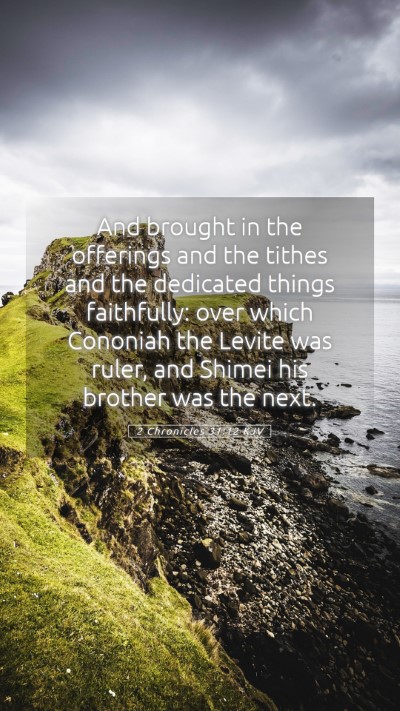Understanding 2 Chronicles 31:12
Verse: "And they brought in the offerings and the tithes and the dedicated things faithfully: over which Conaniah the Levite was ruler, and Shimei his brother was the next." (2 Chronicles 31:12)
Overview
This verse highlights the importance of faithfulness in bringing offerings and tithes to God. It also emphasizes the organization and supervision of the offerings by appointed leaders, signifying accountability and order in worship practices.
Bible Verse Meanings
The passage illustrates the dedication of the people in their contributions to the temple service. It reveals how the community's faithfulness was managed by leaders, ensuring that their contributions were used appropriately for the worship of God.
Contributions to Worship
The act of bringing offerings and tithes has deep roots in the Old Testament, symbolizing gratitude and acknowledgment of God's provision. Matthew Henry points out that this practice reflects a heart aligned with God's commandments and a community dedicated to spiritual worship.
Leadership and Accountability
Albert Barnes emphasizes the significance of having leaders such as Conaniah and Shimei overseeing these rituals. This not only illustrates a structured approach to worship but also underscores the importance of leadership in spiritual matters.
Faithful Stewardship
Adam Clarke notes that the faithfulness exhibited in this verse represents a broader principle of stewardship in God’s kingdom. The Levites' oversight was crucial for ensuring the sacredness of the offerings, reflecting the responsibility that believers have in how they approach their gifts to God.
Interpretations of 2 Chronicles 31:12
- Faithfulness in Giving: The act of faithfully bringing offerings is an essential part of the worship experience, reminiscent of how believers today are called to contribute to the ministry of the church.
- Community Engagement: This verse exemplifies a unified effort in worship, which is often echoed in modern Bible study groups and church congregations.
- Leadership in Worship: The roles of Conaniah and Shimei illustrate the need for effective leadership in church practices, which can be studied in depth in various Bible study resources.
Historical Context
This verse occurs during King Hezekiah's reign, a time of religious reformation where the nation of Judah was returning to true worship after periods of idolatry. Understanding this context enriches the biblical exegesis of 2 Chronicles 31:12.
Application of 2 Chronicles 31:12
For modern believers, this passage encourages a spirit of generosity, accountability, and order in spiritual practices. It serves as a template for how faith communities might organize their worship and giving effectively.
Additional Cross References
- Leviticus 27:30 - The principle of tithing and offerings.
- Malachi 3:10 - A call to bring the whole tithe into the storehouse.
- 2 Corinthians 9:7 - Guidance on how to give cheerfully.
Conclusion
2 Chronicles 31:12 is a reminder of the importance of faithfulness in both giving and leadership within the context of worship. It calls believers to examine their own practices in light of biblical instructions regarding contributions to God’s work.
Further Study
For those interested in diving deeper into the meaning of Bible verses and how they apply to daily life, consider the following:
- Participating in Bible study groups for collective insights.
- Utilizing online Bible study tools for deeper learning.
- Engaging in courses that explore the historical context of Bible verses.
In summary, the study of 2 Chronicles 31:12 provides rich insights into the nature of giving, leadership, and community worship which are integral to understanding Scripture and applying it in today’s religious practices.


